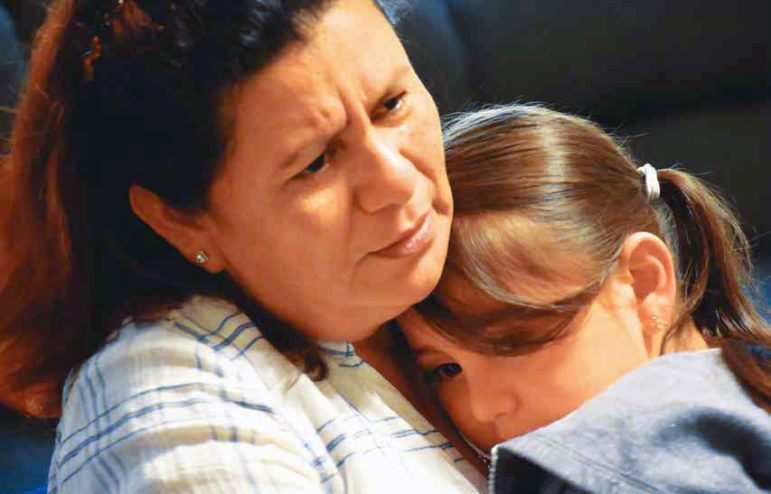
Courtesy of La Unión Del Pueblo Entero
.
Punitive immigration policies create public health issues affecting entire communities, two advocacy groups say in a new report focusing on families in Texas’ Rio Grande Valley.
Human Impact Partners, whose aim is to apply public health principles to policy questions, and La Unión Del Pueblo Entero, a community-based organization of immigrants in the Valley, wanted “to show how these policies impact individual, family and community well-being,” said Jonathan Heller, a co-director of Human Impact. The report is being released today.
Researchers surveyed 212 residents affected by the immigration system and conducted three focus groups. They also interviewed local medical, education and business professionals and used statistics from U.S. Immigration and Customs Enforcement to estimate the number of people in the region who are touched by the immigration system.
They estimate that approximately 1,800 U.S.-born children in the Rio Grande Valley had a parent deported by immigration officials in fiscal year 2017, Heller said.
Of the undocumented parents surveyed:
- 29 percent reported that their children experienced serious stress because of a parent’s immigration status and more than half said their children feared they would be deported;
- 19 percent reported that their children exhibited symptoms of post-traumatic stress disorder (PTSD), about four times higher than the prevalence of that disorder in the general U.S. population, and
- 40 percent said their children exhibited school avoidance, as did 30 percent of immigrant parents with protected status and 20 percent of those who are U.S. citizens.
Fear of deportation causes direct stress for entire families that affects mental and physical health. Children experiencing serious anxiety and PTSD symptoms are familiar to anyone who works with immigrant families, said Rachel Osborn, a social worker in Washington, D.C. She is senior clinical manager of the School Based Mental Health Program at Mary’s Center for Maternal and Child Care, which has locations in both Washington and Maryland.
“It manifests in all sorts of ways: difficulty focusing in class, low motivation, gastric complaints, even anxiety attacks,” Osborn said. “I remember clearly a child clinging to her mother, not wanting to go into the school building because she was afraid her mom would be deported while she was at school.”
Advocates hope for change in local laws
In the context of defending immigrants against deportation, those stresses on children who are U.S. citizens are not only familiar but become the facts arguing for the parent’s release, said Carrie Chavez Thompson, a managing attorney at the Refugee and Immigrant Center for Education and Legal Services, a nonprofit organization that provides legal assistance to immigrant families in south Texas.
“You see children with extreme anxiety,” she said, “kids as young as 3 or 4 with the understanding that there is something massively wrong in their home because someone could go missing at any time.”
This does not only affect the children of undocumented immigrants, Heller said, as “little kids don’t understand immigration status and they see it everywhere around them.”
“This affects the physical health and mental health of pretty much everybody in the Rio Grande Valley,” he said.
Immigration policy has another direct health impact because immigrant families who cannot pass through immigration checkpoints are unable to travel to access health care.
“One thing I learned that I had not known about is that there are these checkpoints that are not on the border but far from the border, and people living between the border and those checkpoints are trapped,” Heller said. “If they are sick or if their kids are sick, they can’t get to a hospital.”
The advocates hope that seeing the impact on the whole community could make local jurisdictions change their policies about how their law enforcement officers interact with immigrants, he said. “There are choices they can make that would be improving the health and well-being of their communities,” he said. “There is some leeway in what they have to do and what they can do.”
Thompson agreed that showing the effect of immigration policy on the whole community could be useful.
“If young people are unable to reach their potential or are handicapped by mental health issues in the long run it becomes an economic issue,” she said. “You are going to have people who are less able to engage in the community, to work, who may have long-term disability and it’s going to be economically detrimental for us as a community.”





























